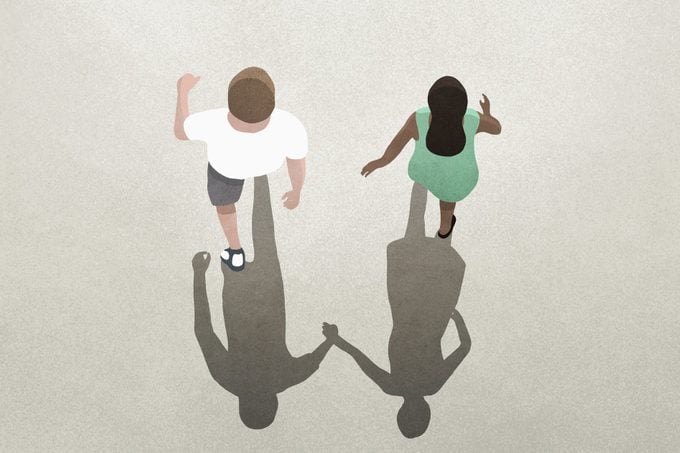Are You in a Situationship? How to Tell and What to Do About It
Updated: Jul. 15, 2021
Here's what it means to be in a situationship and what experts recommend you do about these often confusing relationships.
Our editors and experts handpick every product we feature. We may earn a commission from your purchases.
What is a situationship?
Situationships are confusing to define and open to interpretation.
The catch-all definition of a situationship is an undefined romantic relationship, according to sex and relationship therapist Joe Kort.
“It isn’t given the same value or credit that a romantic love relationship would be if one is dating and looking for a permanent or long-term partner,” he says.
Situationships may involve sex and romance, but they don’t have the trajectory to move forward to a mature, loving relationship. Think of it essentially as short-term dating without an agenda.
Sanam Hafeez, a neuropsychologist and faculty member at Columbia University in New York City, adds that situationships don’t have any goals, terms, or purpose.
“A primary reason situationships are formed in the first place is because of the uncertainty that comes along with hookup culture,” Hafeez says.
In some cases, people may be nervous about defining the relationship too early. So, they end up waiting around in the situationship gray area.
Paul Hokemeyer, a clinical and consulting psychotherapist in New York and author of Fragile Power: Why Having Everything Is Never Enough, thinks situationships are simply another word for hookups.
He says the primary objective is sexual gratification rather than emotional enrichment. These non-relationship relationships form because of a biological need for a sexual release with just enough human connection with a partner, says Hokemeyer.
We spoke with experts about the ins and outs of situationships—and how they could impact your emotional and mental health.
How to tell if you are in a situationship
Hafeez says a simple way to know if you’re in a situationship is if the relationship is undefined.
“Hookup culture has made defining relationships very confusing and stressful,” she says.
“If you have been seeing a person for a while, but haven’t had the ‘what are we doing’ conversation, then you most likely are in a situationship.”
Kort adds that people don’t talk about it and just let it flow and assume it is a situationship. Or they talk about it from time to time without defining it too much or at all.
Another red flag or sign of a situationship is inconsistency.
If you’ve been either hooking up with or seeing someone for a long time, but you never know the next time you’ll see them again, you probably are in a situationship, according to Hafeez.
There’s no agenda on when or if you will see each other again, and time together is purely situational. There’s no counting on each other, expectations, or meeting of friends or family necessarily.
“There is no talk about the future because there may or may not be one,” Kort says. “And it will organically go in the direction it was meant to be.”
Even though they may text or call, it’s sporadic. And it’s one way people in situationships are breadcrumbing.
Marriage and family therapist Jane Greer, author of What About Me? Stop Selfishness From Ruining Your Relationship, says this usually works for one person and not the other.
“It works for the person who wants no commitment and no accountability and no real involvement,” she says.
The bottom line is you’re not that important to the person you’re in the situationship with, according to Greer. People in situationships don’t want to be held to anything.
“To have no expectations of another person is a get out of jail free card,” Greer says.
(Here are the signs you’re in a toxic relationship.)
Are labels really that important?
If a situationship is an umbrella term, is it even a label worth using?
Hokemeyer personally likes the name.
“It suits, and I like having a label to put on things,” he says. “Labels enable us to clearly identify what’s going on and give us power to walk toward or away from that which we’ve labeled.”
Kort agrees saying that he thinks it matters what we call things because it provides a framework.
For example, if you think you’re in a “friends with benefits” situation, but the other person thinks it’s a situationship, lots can go wrong.
What the difference? Generally, both people in a friends-with-benefits situation know that the relationship is mostly platonic and not destined to become a long-term relationship, even if they occasionally have sex.
That’s not true with a situationship, where the expectations may not match.
“You need to be on the same page, even if both of you agree to be vague about what is going on, like in a situationship,” Kort says.
Hafeez says that if you’re knowingly in a situationship, it doesn’t really matter whether you actually call it that or not.
“The bottom line is, you are in a relationship with no boundaries, goals, or consistency,” she says.
Greer says it’s less about the label itself and more about awareness of the situation and reality.
“It’s important to know you’re on a roller coaster because if you’re afraid of heights, you won’t get on,” she says.
What’s the difference between early dating and a situationship?
The main distinction between a situationship and early dating is forward motion and expansion, according to Greer.
For example, over time, you might start spending more time together, share intimate details of your life, or meet friends if you are getting to know someone to develop a relationship.
“There’s a growth component that’s involved in dating that moves it forward,” Greer says. In a situationship, it doesn’t go anywhere.
“You take whatever the person is prepared to give you,” she says. Again, people in a situationship lack accountability and may break plans or not follow through.
(Here are the characteristics of a healthy relationship.)

Are there any positives to situationships?
One good thing is they can be a lot of fun, according to Hokemeyer. “They can fill the day or evening with excitement,” he says.
Some people in a situationship enjoy not having to deal with the pressure of the beginning of a relationship, Hafeez notes.
“In some ways, not knowing each other’s end goals can help the couple grow closer together,” she says.
Kort says that a situationship could be perfect for some people aware of unresolved issues, traumas, and past hurts because they don’t have to go too deep and know that they can protect themselves.
There are plenty more risks
One of the primary risks is that one person could develop feelings for the other person. This could harm your emotional and mental health if expectations are unclear.
“If the emotions continue building without ever defining the relationship, the person will start to feel as if the feelings are not reciprocated,” Hafeez says.
Plus, people in extended situationships could develop negative self-esteem, according to Hafeez.
Unless you know you don’t want commitment and certainty in your life, a situationship is only going to create an undercurrent of anxiety, Greer says.
The lack of consistency and accountability is a recipe for anxiety.
If the feelings are unrequited, trying to convince someone to commit to you could ultimately lead to rejection, feelings of unworthiness, or an unhealthy relationship.
“If you are secretly hoping for more or have convinced yourself you can do it, but the whole time you are distressed, it could lead to problems for yourself,” Kort says.
It can also harm your mental health in that you start obsessing about the other person.
Who should walk away from situationships?
On the surface, Hokemeyer has no problem with situationships. However, it could be messy for people really built for long-term relationships and struggle with intimacy issues.
People who might especially want to avoid situaitonships are those looking for long-term meaningful connections with other people, as well as codependent people or people who develop romantic feelings quickly.
“For these people, any short term pleasure will be greatly outweighed by long term psychic pain,” Hokemeyer says.
Kort says that those with high levels of anxiety or a history of unhealed or unresolved trauma are also at risk if in a situationship. The lack of strong connection could be triggering.
Even your attachment style could also play a role, too. Attachment style is how you bond, with some people being secure or confident, while others tending to be more insecure or anxious in relationships.
“If your attachment style is insecure or anxious, then this could get in the way of tolerating a casual relationship like this without rules,” Kort says.
If you have a dependent personality and need feedback and attention, situationships could lead to low self-esteem and negative feelings.
Other people who may want to avoid this type of relationship are those who haven’t healed post-breakup, insecure people, and easily jealous people.
(Make sure you know the signs of a toxic relationship.)
What therapists recommend for people in situationships
Situationships are not always bad, but if your goal is a relationship, a situationship is not for you, Hafeez says.
Hokemeyer’s advice is to be honest about what you really want and what you’re getting in a situationship. And know going in that a great value in the situationship is that you can get out.
“Stay conscious and connected to how you are doing and feeling during this situationship,” Kort says.
“If at any time you feel it is jeopardizing your mental health I recommend you either abort, take a break or check-in with a friend or therapist to give you some feedback.”
(This is the type of breakup that hurts the most, according to science.)
How to get out of a situationship
Get out just like you got in, Hokemeyer advisees, quickly and cleanly. “There is no need to explain your decision or to assuage the other person’s feelings,” he says.
But do avoid ghosting.
“I never believe in ghosting,” Kort says. “I think it is important to be direct with the other person letting them know that it is no long working and that you are moving on.”
Opt for a direct conversation, Greer also suggests.
Consider asking, “Am I a priority? Is spending time with me a priority?” Or asking if they think about spending more time together.
She also recommends even directly asking if you are in a situationship. If you ask questions from a place of curiosity and not negativity, you’ll likely get clarity.
(Here are more science-based facts about breakups.)
Can a situationship turn into a relationship?
In short, yes. And that’s fine if that’s where it goes. Just don’t make it an expectation, Kort notes. And prepare for the possibility of rejection.
“Anything can turn into a relationship if the partners are compatible,” Hokemeyer adds.
Essentially, the same conversation about getting out of a situationsip could theoretically lead to a relationship. Remember to communicate your needs and desires and to set firm boundaries with your partner.
Next, check out how to move on from a relationship.






















